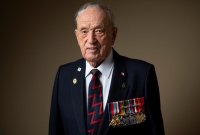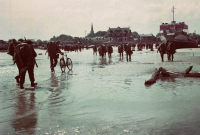Support strong Canadian climate journalism for 2025
The terrible and tragic story of the Second World War played out in an elaborate ceremony in this city in southern England on Wednesday, mere metres from where thousands of Canadian, American and British soldiers boarded a flotilla of ships exactly 75 years earlier — the eve of D-Day.
The ceremony, in which Canada and its role in helping free Europe from Nazi Germany figured prominently, was attended by Prime Minister Justin Trudeau, U.S. President Donald Trump, Queen Elizabeth and other world leaders as well as a handful of the veterans — most now in their 90s — who fought in that conflict to free the world of tyranny.
Under a hazy sky and with a brisk breeze flowing in from the harbour, the ceremony charted the course of the war in Europe: from Germany's invasion of Poland in September 1939, which pulled in France, Britain and Canada, among others, to the fateful decision to launch the invasion of Normandy on June 6, 1944.
Along the way, actors and dignitaries recited sombre diary entries and letters written by those who had fought — and in some cases died — in the war, while dancers and musicians recalled some of the music of the day before turning to martial military tunes.
At one point, Trudeau took the stage to recount the story of Lt.-Col. Cecil Merritt, who was awarded a Victoria Cross — the military's highest decoration — for his role in saving countless fellow Canadian soldiers during the disastrous raid on the French port of Dieppe in August 1942.
"Although twice wounded, Lt.-Col. Merritt continued to direct the unit's operations with great vigour and determination," Trudeau said, reading from a citation in the London Gazette from October 1942.
"He then coolly gave orders for the departure and announced his intention to hold off and 'get even with' the enemy. When last seen he was collecting Bren and Tommy guns and preparing a defensive position which successfully covered the withdrawal from the beach."
More than 900 Canadians died at Dieppe and nearly 2,000 more were captured, including Merritt. But as Wednesday's ceremony noted, the lessons learned from that attack helped carry the Allies to victory in Normandy before the liberation of Paris and, eventually, the fall of Berlin.
The Allied invasion of Normandy involved nearly 150,000 troops — including 14,000 Canadian soldiers — who stormed ashore in the face of German machine gun fire. Before the day ended, 359 Canadians had been killed and another 715 wounded or captured. The battle for Normandy would continue for another two months and cost more than 5,000 Canadian lives.
Wednesday's ceremony also featured accounts from U.S. and British soldiers as well as addresses by Trump, French President Emmanuel Macron and the Queen, who thanked the veterans for their bravery and sacrifice.
World leaders will continue the commemorations in Normandy on Thursday, including at Juno Beach, the eight-kilometre stretch of coastline where the Canadians came ashore.





Comments